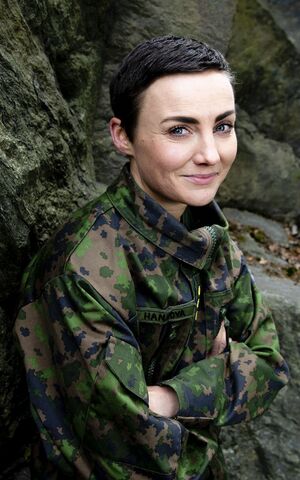Eliska Hanáková
This article is incomplete because it is pending further input from participants, or it is a work-in-progress by one author. Please comment on this article's talk page to share your input, comments and questions. Note: To contribute to this article, you may need to seek help from the author(s) of this page. |
Eliska Hanáková | |
|---|---|
 Hanáková in 2014 | |
| Born | 12 May 1975 Aszód, Ruvelka |
| Allegiance | |
| Service/ | |
| Years of service | 1993–Present |
| Rank | Chief Regimental Commander |
| Commands held | Chief of the Imperial General Staff Army Group Center 13th Mountain Infantry |
| Battles/wars | Imerti Conflict Zemplen War |
| Awards | see below |
Eliska Varteni Hanáková (born 12 May 1975) is a Ruvelkan Imperial Army chief regimental commander currently serving as the Chief of the Imperial General Staff, succeeding CRC Olivér Kovács in December 2019. As Chief, Eliska is the highest-ranking and most senior officer of the Ruvelkan Imperial Armed Forces and at age 45 is the youngest CRC to serve in that role.
Eliska was born in 1975 and raised in Aszód, joining the Imperial Army in 1993 as part of the Army’s officer training program and attended the Derecske Military Institute. Graduating in 1994 with a degree in military leadership, Eliska was commissioned as a military-major into the 7th Mountain Division. She later went on to serve with the 15th Infantry Division, 4th Infantry Division, and 2nd Special Operations Group before being promoted to command of the 13th Mountain Division. The 13th Mountain was briefly mobilized and participated during the Imerti Conflict.
In 2008 at the start of the Zemplen War, Eliska was given a brevet promotion and command of Ruvelka’s Army Group Center which made her responsible for the defense of central Ruvelka and the southern half of the Kurilla mountains. Her theater pitted her forces primarily against the SCAF’s Army Group Beta, first under the command of Aleksandar Čorić and later Arisdages Koundakjian.
Eliska’s reputation as a commander was initially heavily criticized during the war and in its immediate aftermath having lost several battles, performing a number of retreats, and failing to effectively engage and destroy Army Group Beta. However, in recent years it has been recognized that her operational leadership and strategic foresight allowed Army Group Center to remain a cohesive fighting force throughout the war and a major component to Ruvelka’s overall strategic victory.